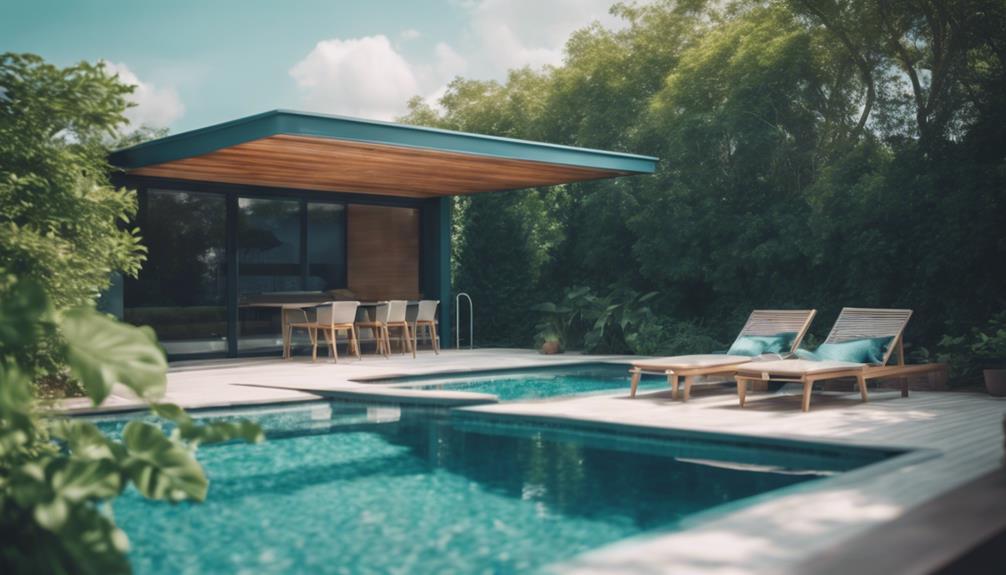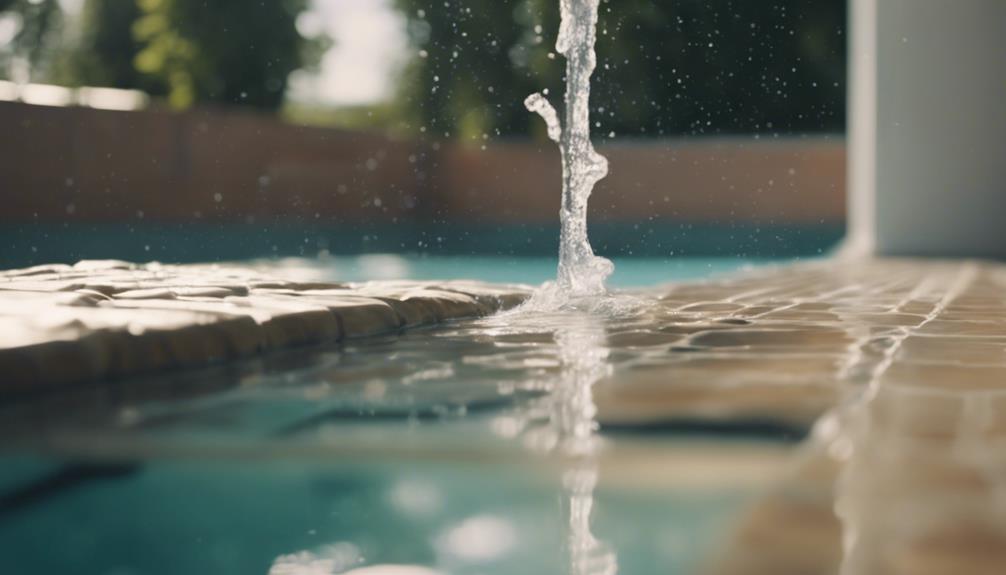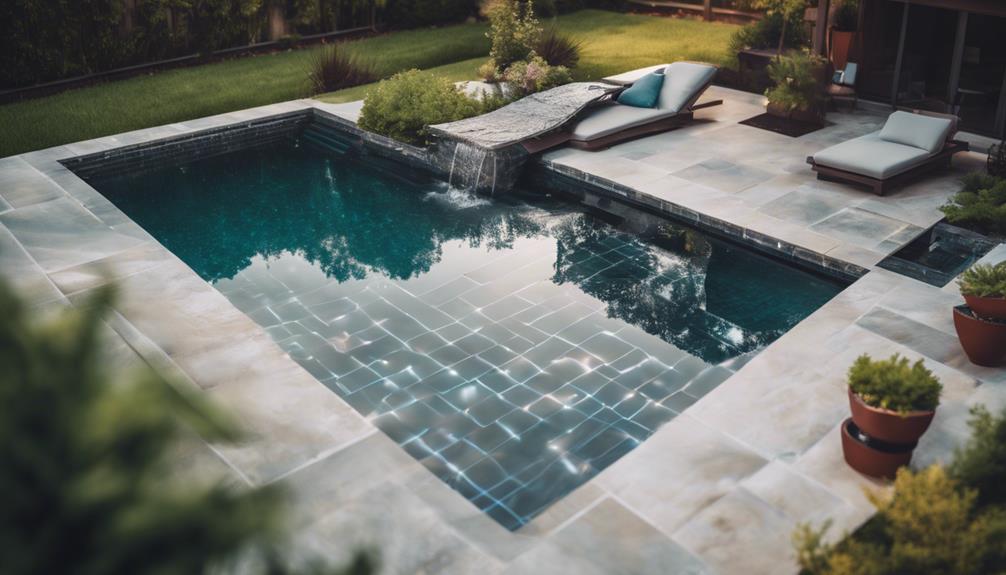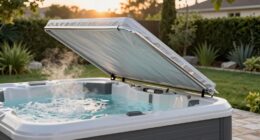Eco-conscious swimming pools highlight innovative methods to decrease environmental impact. Utilizing salt sterilization systems instead of chlorine offers a natural and pleasant swimming experience. Employing high efficiency pool pumps and filters can lead to significant energy savings and operational cost reductions. Opting for low NOx emission heaters not only heats the pool effectively but also reduces the carbon footprint. Implementing automatic pool covers preserves heat and water quality while enhancing safety. Incorporating automation features guarantees top efficiency in filtration, heating, and sanitation tasks. These practices collectively contribute to a more sustainable and environmentally friendly pool operation.
Key Takeaways
- Salt sterilization systems provide natural chlorine, reducing chemical irritation.
- Energy-efficient pool pumps and filters conserve resources and save money.
- Low NOx emissions heaters reduce carbon footprint and heat water efficiently.
- Automatic pool covers minimize heat loss, evaporation, and enhance safety.
- Automation systems optimize energy use by synchronizing pool operations.
Sanitization Methods
The most common chemical used in pools for sanitization is chlorine, known for its effectiveness but also for causing skin and eye irritation. While chlorine is efficient in killing bacteria and algae, its harsh effects on swimmers have led to the development of alternative methods.
Salt sterilization systems offer a natural way to convert salt into chlorine, resulting in fewer side effects compared to traditional chlorine treatments. Additionally, salt-based systems provide the water with a silky feel, enhancing the swimming experience.
Energy Efficiency
Enhancing pool sustainability can be achieved through the implementation of high efficiency equipment and energy-saving practices.
To improve energy efficiency in swimming pools, consider the following:
- High Efficiency Pool Pumps: Utilize variable speed pumps to reduce energy usage by up to 90%.
- Energy-Efficient Filters: Opt for high efficiency models that conserve water and minimize maintenance requirements.
- Upgrade to Save: Upgrading to energy-efficient equipment can result in savings of over $1,000 annually while reducing noise levels and enhancing overall pool enjoyment.
Pool Heating

Improving pool sustainability through efficient heating methods is essential for reducing environmental impact and enhancing overall energy efficiency.
Low NOx emissions heaters are a safer option for the environment, as they contribute less to smog and acid rain compared to traditional heaters. In addition to being eco-friendly, low NOx heaters heat water faster and are more energy-efficient.
Selecting the right pool heater is vital in ensuring that the pool operates in an environmentally friendly manner. By choosing a low NOx heater, pool owners can enjoy a comfortable swimming experience while minimizing the pool's carbon footprint.
Making informed decisions about pool heating solutions is a significant step towards creating an eco-friendly swimming environment.
Automatic Pool Covers
Implementing automatic pool covers can greatly enhance the energy efficiency and maintenance of swimming pools. Automatic pool covers provide various benefits that contribute to a more sustainable pool operation:
- Energy Savings: By covering the pool when not in use, automatic pool covers reduce heat loss and evaporation, leading to lower energy consumption for maintaining water temperature.
- Improved Water Quality: The covers act as a barrier against debris, dirt, and leaves, keeping the pool cleaner and reducing the need for frequent cleaning and chemical treatments.
- Safety: Automatic pool covers enhance safety by preventing accidental falls into the pool, especially for households with children or pets.
Automation and Synchronization

Automating and synchronizing pool equipment operations through advanced controls maximizes efficiency and reduces energy consumption in eco-friendly swimming pools. Automated features streamline the management of tasks such as filtration, heating, and sanitation, ensuring they run at the most energy-efficient times.
By synchronizing different components of the pool system, such as pumps, filters, and heaters, energy usage can be minimized while maintaining ideal water quality. These systems can be programmed to operate during off-peak hours when energy costs are lower, further contributing to overall energy savings.
Consulting with pool contractors to select the best automation features tailored to the specific pool setup can maximize the eco-friendliness of the pool while controlling maintenance expenses.
Frequently Asked Questions
What Are the Benefits of Using Natural Enzymes for Pool Maintenance?
Natural enzymes for pool maintenance offer eco-friendly benefits. They break down organic matter, reducing the need for harsh chemicals. Enzymes improve water clarity, reduce odors, and enhance overall water quality. They are safe, biodegradable, and sustainable options for pool sanitation.
Can Solar Panels Be Integrated Into the Pool System for Energy Savings?
Solar panels can be seamlessly integrated into pool systems for significant energy savings. Harnessing solar power reduces reliance on traditional energy sources, cutting costs and minimizing environmental impact. Consult with professionals for best solar panel placement and efficiency.
How Can Landscaping Around the Pool Contribute to Eco-Friendliness?
Landscaping around the pool can enhance eco-friendliness by strategically planting trees and bushes to provide natural shade, reducing the need for excessive cooling. Additionally, selecting native plants can conserve water and support local biodiversity, promoting sustainability.
Are There Eco-Friendly Options for Pool Lighting?
Eco-friendly options for pool lighting include LED lights, which are energy-efficient, durable, and long-lasting. LED lights consume less power, emit less heat, and provide customizable color options. Upgrading to LED lighting enhances sustainability and reduces energy costs.
What Are the Best Practices for Rainwater Harvesting to Fill the Pool?
Harnessing nature's gift, rainwater harvesting replenishes pools sustainably. Implementing efficient collection systems with appropriate filters guarantees purity. Balancing conservation and enjoyment, this practice exemplifies eco-consciousness in pool maintenance and water preservation.
Conclusion
In the ever-evolving world of swimming pool maintenance, embracing eco-friendly practices is not just a trend but a necessity. By making conscious choices in sanitization, energy efficiency, heating, pool covers, and automation, pool owners can paradoxically enhance both the environment and their pool experience.
It's ironic how going green not only reduces our carbon footprint but also improves efficiency, safety, and overall enjoyment. Embracing eco-friendly swimming pools is the way forward in the pursuit of sustainability.










